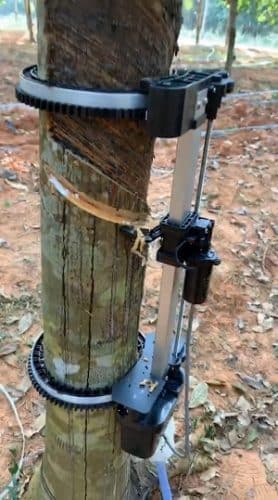LoRa Long-Range Low-Power Wide-Area Networking (LPWAN) automates rubber-tapping and improves yields 2-3x over manual tapping

STMicroelectronics has announced a design win for STM32WLE5, the world’s first LoRa System-on-Chip (SoC). The customer application, developed by automated rubber-tapping specialist CIHEVEA, uses low-power networking to revolutionise the automation of extracting latex from rubber trees. CIHEVEA has equipped more than 200,000 rubber trees within its Hainan rubber-tree plantation with its innovative solution to improve rubber-tapping productivity and output capacity.
The ST LoRa SoC acts as a highly efficient, low-power communication hub and control centre for the Rubber Tapping Robot from CIHEVEA. The robot also includes two precision motors and a series of environmental sensors that monitor weather conditions, including temperature, air pressure, and humidity. Clamped to the tree, the STM32WLE5 transmits the sensors’ data to a mesh gateway via a dedicated LoRa application network server, where the server can monitor, test and debug, and coordinate the robots in the field. Once all pre-set conditions are met, the SoC triggers the rubber tapping motors to perform autonomous cutting, which usually happens very early in the morning.
Leveraging the cost-effective, high-efficiency STM32WLE5 and LoRa networking, CIHEVEA’s novel solution increases latex yield by 2-3x while minimising damage to trees, prolonging the trees’ productive lifespan. In addition to improving yields and extending asset lifetimes, the rubber-tapping robot also resolves chronic labour challenges, as tree tapping can be difficult and dangerous for human workers.
The STM32WLE5 is an ultra-low power multi-modulation wireless SoC microcontroller that combines an Arm Cortex‐M4 core running at 48 MHz, a sub-GHz radio allowing long-range connectivity, and a proven collection of ST-designed peripherals. Delivering high-performance while operating from a package as small as 5mm x 5mm (UFBGA), the STM32WLE5 is both cost-effective and meets the robustness and performance requirements of the agriculture industry. The STM32WLEx microcontroller is also an open platform supporting LoRa, (G)FSK, (G)MSK, and BPSK modulations.
“The fully automatic, intelligent, rubber-tapping system is a revolution for the rubber industry. With the increased use of platform technology and the ability to communicate via the low-power LoRa network technology provided by the STM32WLE5, the smart rubber-plantation platform system is creating a new rubber-plantation ecosystem, moving away from traditional high-intensity, heavy-pollution, inefficient, production methods and is ushering in a new era of green environmental-protection, high-efficiency, digital transformation,” said XU Zhen Kun, Vice Chairman of CIHEVEA.
“While rubber trees are a sustainable source of an important material widely used in industrial, transport, and agriculture sectors, improving rubber-tapping efficiency, and increasing latex yield has long been a goal of rubber producers and using the STM32WL5 and its LoRa networking is a natural fit,” said Arnaud Julienne, Vice President, Microcontrollers and Digital ICs Group, AI/ IoT competence centre and Digital Marketing, Asia Pacific Region, STMicroelectronics. “Moreover, our unique and broad portfolio of products and solutions in connectivity, sensing, and a large portfolio of power-management and motor-control solutions is well suited to the full range of smart farming domains, including tracking, irrigation systems, tractors, and livestock position and health monitoring.






